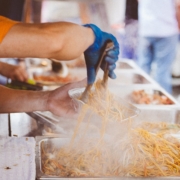Is Your Restaurant’s Pie of Repair Costs Increasing Day by Day?
Any business has to incur a mix of fixed and variable expenses. If you are running a restaurant business, you will have expenses like salaries and rent that you incur irrespective of the number of open days and customers’ footfall. Expenses on food item purchases, however, would vary on the scale of business.
When it comes to repairs and maintenance, a certain amount of it is expected in any business. Items like your kitchen equipment and air-conditioning will go through regular wear and tear. However, when these expenses occur too frequently, you need to sit up and take notice.
You look into the expense trend, sift out the avoidable ones from the unavoidable ones, and look for ways to avoid them to the extent possible. Here is a coordinated approach that you can adopt to keep your restaurant repair cost within the tolerable limit:
Budget and analysis
Excessive costs erode a business’s profitability, sometimes to an alarming degree. It is always worthwhile to update budget figures and take stock of the restaurant’s various expenses. Depending on the equipment’s age, warranties available, number of items that need repair, etc. an estimate of the repair costs can be made. A detailed list of all these items should be in place, along with the maintenance requirement against each of them. Some of these items would be under warranty; some covered under maintenance contracts while the rest would need one-time repairs. After that, a regular analysis of the expenses incurred and noticing deviations between budgeted and actual costs ensure prompt identification of unexpected expenses. The expertise of service providers like Pulse comes handy in such workflow management and helps increase the business’s profitability.
Maintenance contracts
Repairs in a restaurant may be required for kitchen equipment, refrigeration, plumbing, and heating, ventilation, and air-conditioning (HVAC) equipment. By entering into maintenance contracts for these items, you can successfully reduce your long-term operating costs. Inking annual maintenance contracts puts various scheduled maintenance in place, which prevents breakdowns and subsequent losses. These contracts help you avoid large expenses that you would otherwise have to incur. In order to manage these contracts, you can use Pulse’s “Track and Assign Actions” feature.
Industry standards
As a thumb rule, repairs of 1-3% of the overall budget is considered tolerable. However, depending on your location and industry, you should find out how your peers are doing for repair costs. This acts as a useful benchmark in understanding and budgeting your restaurant expenses. Probing into industry standards will also enlighten you about the restaurant’s best practices that can further streamline your day-to-day operations.
Staff awareness
It is not practical to remind employees of rising expenses without doing your homework. But with an updated budget in your hand, maintenance contracts in place, and knowledge of the industry, you are better equipped. The next step would be to sensitize your staff about the various practices that can reduce the need for repair. It could be by encouraging simple daily practices like avoiding unnecessary use of equipment, following standard operating procedures (SOP) while using them, and educating them about early warning signs of malfunctioning equipment. Notably, Pulse provides checklist-based inspection processes that can be customized and put in place in your restaurant operations.
Optimizing layout
In a customer-facing service like a restaurant, the layout is important for various reasons. An attractive layout can woo more customers, improve the ambiance, simplify operations, and minimize expenses. Smart layouts can minimize air-conditioning, reduce the preparation time in the kitchen, and even reduce breakages. A congested layout, on the other hand, generally leads to more cutlery breakages, while a haphazard seating arrangement can increase the consumption of utilities and their wear and tear. Similarly, improving the kitchen set up can reduce the pressure on equipment and the workforce and improve efficiency.
Conclusion
With a focused approach towards your restaurant’s repair costs, you can keep better control over your restaurant expenses. And by adopting standardized processes and regularly monitoring and auditing the spending patterns, you can be better prepared to meet your restaurant’s repair and maintenance needs.
The BARE-IFY Audit App is an advanced safety compliance and auditing tool is an audit and inspection platform with robust incident reporting mechanisms and super user-centric UI. By making your company’s incident reporting process more straightforward, you’ll reduce the time your employees spend in reporting incidents and automatically cut back on opportunistic mistakes.
Pulse also offers ready-to-use checklists for multiple industries so that you can stay on the top of your compliance game and reduce the chances of incidents.











